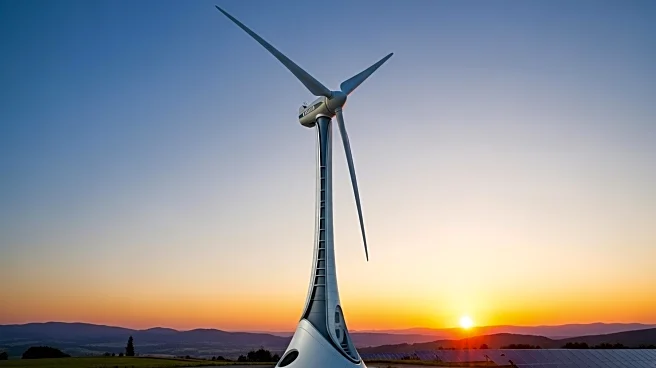What's Happening?
China has achieved a significant milestone in the global energy market by surpassing the United States in clean technology exports. According to recent reports, China's cleantech exports reached a record $20 billion in August, driven largely by electric vehicle (EV) exports. This development marks a shift in global energy dynamics, as clean technology, which includes renewable energy sources and electric vehicles, is increasingly favored over traditional fossil fuels. The transition is highlighted by the fact that cleantech products, unlike fossil fuels, are durable and recyclable, offering long-term energy solutions. This shift is not only altering trade patterns but also influencing global energy consumption and economic strategies.
Why It's Important?
The rise of China's cleantech exports signifies a pivotal change in the global energy landscape, with potential long-term impacts on international trade and environmental policies. As clean technology becomes more prevalent, countries that rely heavily on fossil fuel exports may face economic challenges. Conversely, nations embracing cleantech could experience economic growth and increased energy independence. This shift also has environmental implications, as it supports global efforts to reduce carbon emissions and combat climate change. The transition to clean energy technologies could lead to a decrease in global fossil fuel consumption, impacting economies that are heavily dependent on oil and gas exports.
What's Next?
As the global energy market continues to evolve, countries may need to reassess their energy policies and trade strategies. The United States, in particular, may face pressure to increase its investment in clean technology to remain competitive. Additionally, international trade policies could shift to favor cleantech over fossil fuels, potentially leading to new economic alliances and trade agreements. The ongoing development and adoption of clean technologies are likely to accelerate, driven by both market forces and regulatory changes aimed at reducing carbon emissions. This could result in a more sustainable and resilient global energy system.
Beyond the Headlines
The shift towards clean technology also raises ethical and cultural considerations. As countries transition from fossil fuels to renewable energy sources, there may be resistance from industries and communities that are economically tied to traditional energy sectors. Moreover, the global move towards cleantech could exacerbate existing geopolitical tensions, particularly between countries that are major producers of fossil fuels and those leading in clean technology innovation. The long-term success of this transition will depend on the ability of governments and industries to manage these challenges while ensuring equitable access to clean energy technologies.











